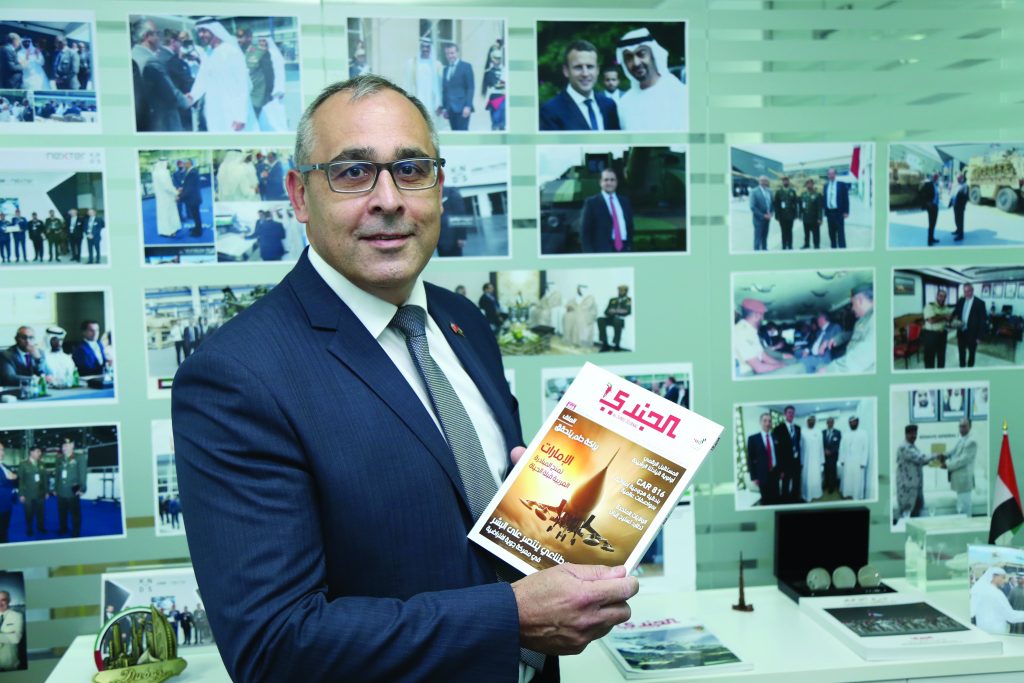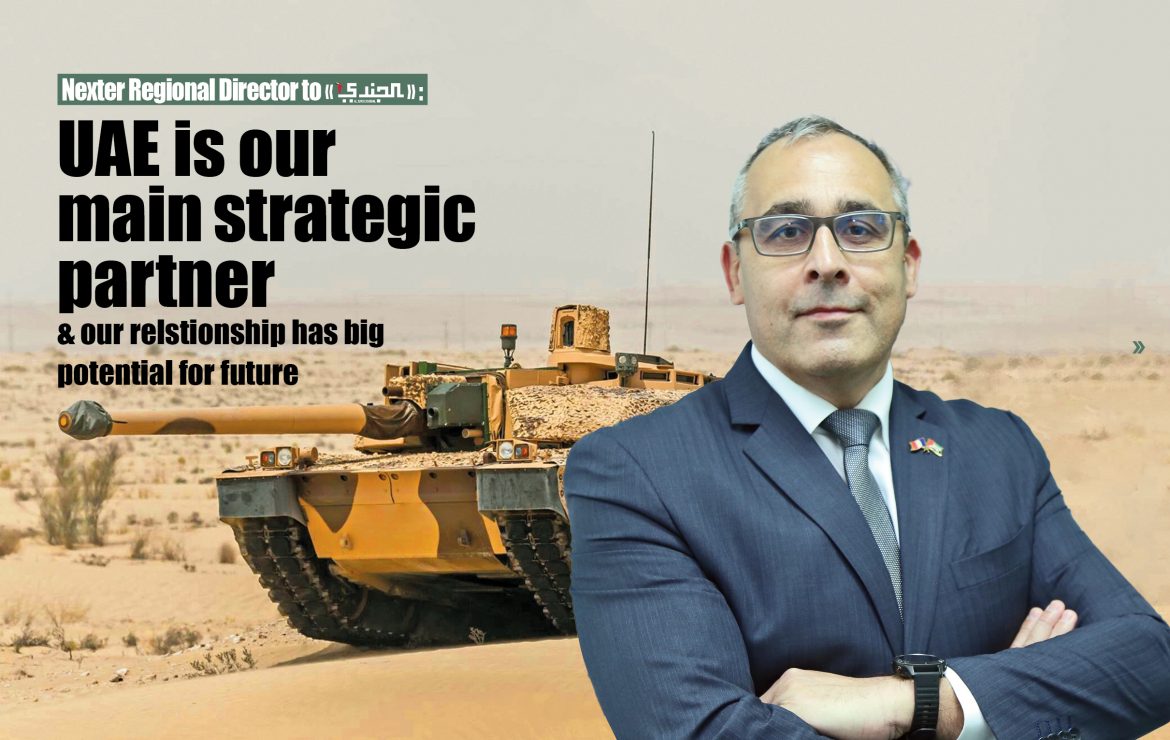Nexter Group, a key player in land systems market, has maintained a long-standing relationship with the UAE. This relationship was cemented in 1993 when the UAE acquired LECLERC main battle tanks. As Nexter is also considered one of the main suppliers of land systems to most of the Gulf countries armed forces, Al Jundi Journal reporter, M. Fahed AL Halabieh, met with Mr. Dominique Morisset, Nexter Group Director in UAE & Jordan and discussed with him the relationship and cooperation between his company and UAE, areas of this cooperation, their support for the UAE military industry and their role in supporting efforts to confront emerging threats in the Gulf region, and some other related issues. Here are excerpts:
Can we have an overview about Nexter Company, please?
Nexter is a group of companies that develop, design and produce land defence systems, such as various types of armored vehicles, artillery systems, and of course main battle tanks. We are also developing and producing different types of ammunition from medium calibers to artillery calibers. In addition, we have technological subsidiaries dealing with optronics, chemical, radiological, biological and nuclear (CRBN) and robotics.
How do you assess your relationship with the UAE in general and its armed forces in particular?
It is a long-standing one. It started in 1993 when UAE armed forces purchased more than 400 Leclerc main battle tanks from GIAT Industries. Today, our interaction with General Maintenance Corps is very important. It’s a daily technical relationship with proven records. Our relationship with Tawazun Economic Council is of course fundamental. We have currently important offset projects running, particularly in the field of ammunitions. Our relationship with the UAE is very good and has big potential for future. I hope our cooperation is positively looked at by UAE MOD and Armed Forces.

This good relationship with our armed forces resulted in cooperation in more than one area of course. In which domains is this mutual cooperation mostly taking place?
It is obvious that our cooperation is nowadays mostly focused on Leclerc main battle tank activities. I think trust has been built over time. We are more than proud today to contribute to the high level of availability of this fleet. By the way, we are very present for the provision of expertise and solutions in the field of tank ammunitions. We have also developed interesting cooperation in the field of robotics and autonomous systems, which is key for the future. We are also thankful to the UAE Armed forces for ongoing discussions in the field of artillery systems and wheeled armored vehicles. There is no doubt that there are big players in the UAE with whom we can always find ways to build something for future.
Cooperation and partnerships for some defence manufacturer companies are based on “buyer& seller” relations, what about Nexter?
Nexter considers that a strategic partnership is first and foremost to be able to mutually share a long-term vision. In the UAE, our relationship with your Land Forces is close to the one we have with the French Army in France. The level of interaction and mutual understanding with end-users around LECLERC main battle tanks subjects is efficient. In that context, we are proud of how we can benefit from UAE operational experience on the field to build future capabilities of the tanks. This operational feedback is fundamental for us. Of course, at the end, there are contractual and commercial relationships. However, the strategic discussion undoubtedly helps a lot to solve the rare issues between us. In our mindset all our managers – above their contract responsibility – have to adhere to this strategic relationship.
But these contracts are either made through Tawazun “the offset” which requires from the seller company to invest part of the revenues in productive projects in the UAE or through joint ventures with local defence manufactures to coproduce certain equipment or systems in the UAE and consequently transfer certain advanced technology to our military industry, so what is your attitude?
We were one of the first companies to sign the new Tawazun Economic Program Agreement in 2019 and Nexter – as GIAT in the past – has always been proactive in the offset domain either in cooperation with the military directly or in the civilian sector. The way we see things for the future is to build strong and sustainable business cases rather than developing stand-alone and one-shot offset projects. We aim to share and implement a long-term industrial vision. This is why I think doing pure technology transfer is a bit old-fashioned. What could be considered are co-investment for the development of future products, with the objective to create local value and mutual benefits, addressing the regional market. I believe there is a great potential in the field of robotics, digital solutions, smart ammunitions and armored vehicles. Developing the local supply chain is also fundamental to anchor our footprint in the country in a long-term perspective.
To what extent does Nexter contribute to upgrading or developing military capabilities of the armies in the Gulf region?
Nexter is present in almost all countries in the Middle East region. As far as UAE is concerned, there are multiple expressed interests for our artillery CAESAR®, our 6×6 GRIFFON® and TITUS® infantry vehicles and our latest jewel the 6×6 JAGUAR® combat and recce vehicles. We are also proud to continuously support countries using our Leclerc MBT in the region. And of course, we are preparing the modernization of this tank with UAE Armed Forces. We are glad that UAE has confirmed this program. We are ready and well-prepared for that.
When UAE seeks to buy military systems, they have criteria in mind, such as compatibility of the systems with our severe climate conditions, robustness, innovativeness, and most importantly, interoperability with existing systems, to what extent do your systems meet these criteria?
Nexter is not new to this country with difficult climatic conditions. Our main products – Leclerc MBT, CAESAR® 155mm 52-caliber artillery and 8×8 armored infantry vehicles VBCI – are used here for a long time. Our 6×6 infantry armored vehicle TITUS® made a great show during 2015 Summer Trials in Abu Dhabi. In addition, we always have to remind that LECLERC is used here for over 30 years with great success. As far as interoperability is concerned, we have successfully integrated in the tank the new UAE C4I in cooperation with L3HARRIS. We are always open to use of different types of NATO ammunitions in our vehicles.
As you know threats change fast nowadays, to what extent does Nexter have the flexibility to adapt its systems to the new-emerging threats, or develop new solutions in response to these threats?
Basically, our new systems have digital open architecture which enable evolution of our products along their life cycle. Cybersecurity is included in our solution and we consider it very seriously in our designs.
Asymmetric and urban warfare in land defence is also becoming a game changer. We believe the use of robotics will enhance capabilities of our solutions. Smart and insensitive ammunitions are also of most importance. Capability to evolve over the life cycle is also essential. Our 6×6 TITUS® is for example capable of a 9 tons payload and is unique in its category. This payload flexibility while keeping protection and mobility is essential.
As you know Gulf region countries have suffered cyberattacks and drone swarms attacks as well, what capabilities do you have to confront such threats?
This is an important threat nowadays. It makes land warfare much less predictable and very heterogeneous. As far as armored vehicles are concerned, there is a need for a stronger protection with active systems. We are also considering better stealth (acoustics, electromagnetic, optic / thermal, etc.) performances. It is interesting to mention that we have developed a short range air defence systems in cooperation with THALES, the RapidFire® systems which design can defeat not only land targets but also low-speed flying targets. This technology based on our unique 40mm cased-telescoped ammunition.
There is great interest in AI and innovation in the UAE, how can you support this trend?
We are probably the first manufacturer of military armored vehicles to have introduced the concept of “enhanced mission” extending capabilities of armored vehicles using robotics and AI from combat vehicle. As we cannot have pilots of drones in armored vehicles, we have to develop autonomy capabilities to be able to use robotics from vehicles while keeping safety of the crew.
How do you view your cooperation with the UAE military industry and in what areas do you cooperate?
First, we consider our selves as an industrial player in the region. We have invested in several workshops in Abu Dhabi for easing and speeding the maintenance loop of Leclerc tanks. And, we have plans to expand it in the future.
We have great cooperation with EDGE “ammunition and weapons cluster”, either through sub-contracts between us or offset project as well. What is fundamental is not to consider each other as competitors but to see each other as partners complementing each other for the capture new markets together.

When cooperating with UAE military industries, do you have any restrictions on transferring high technologies to them, like some other companies?
In the principle, Nexter is open in that domain. We have already developed quite important partnerships, in Europe and further, and shown our ability to successfully deploy. But of course, we have to comply with governmental export regulations.
As you know there is a fierce competition on the Gulf region market. Where do you place yourself in this competition? What helps you to be a strong competitor? Is it the quality of your products, affordability, or probably your development of new future advanced and promising system(s)?
The whole world is present in the capital of the UAE with different ways of addressing customers and decision-makers. Fair financial and ethical behavior is important to us.
I am personally convinced that customers and end-users perfectly know that French systems have a great quality and reliability. The stability of our companies and the fact that French authorities are supporting our activities is also an important factor. In ten years, Nexter will still be there, and we will still be able to provide parts and services to help evolution of our systems. It is probably not the case of all our competitors or a number of new comers.
In the early nineties, UAE has signed the biggest deal with GIAT Industries, your “parent company”, to acquire LECLERC main battle tanks. From that time up to date, LECLERC has witnessed many improvements. Can you tell us about those improvements and if any were added to our armed forces systems?
We have performed few modifications to their LECLERC tanks related to protection capabilities, the use of new ammunition, integration of new C2 and C4I capabilities. For the life extension and capability enhancement of the LECLERC tank, we envisage to augment firepower, protection, observation capability of the tanks by using robotics and to augment the C2 capability. The French Army has already launched on his side an ambitious plan to implement new technologies while treating the aging of the electronics of their tanks.
Do you like to send any message to the defence community in the UAE?
I would like to tell them that Nexter has sincere ambition and aims establishing a long term and strong industrial partnership, by developing the supply chain and the R&D sectors. We are and will remain your main strategic partner in the Land Defence.
From your own perspective, what was the impact of Covid-19 on defence industry in general and on your company in particular and how did you respond to the crisis that followed it?
It has been and it is still a big challenge for all of us. It has first affected deeply our economic plans. However, I think Nexter managed the issue in a smart way and excellently whether in France or in the UAE. All needs and requests of UAE armed forces were met by Nexter’s personnel in the country. And I would like to take the opportunity of this interview to thank them all.
Photography by: Mohammed Alshaer













